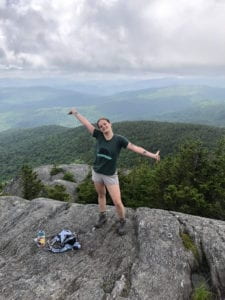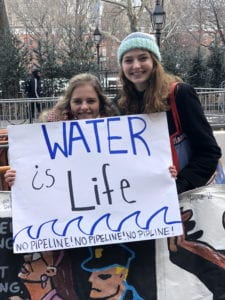The Green Graduate series is a collective of interviews and conversations with environmentally-minded and eco-conscious NYU graduates. As these students move on to the workforce, graduate programs, and other opportunities, we are struck with how different the world seems today than it did a few months ago. Our hope with this series is to inspire, motivate and most importantly, honor the class of 2020.
 Josi Riederer, like many of us, is currently home with her family in Ashland, Virginia. When I spoke to Josi, she had just finished her thesis for Global Liberal Studies on the topic of rural-urban water inequality in Mumbai and Chennai. Through her research, Josi explores what she describes as “the rural-urban water inequality nexus.” Essentially, rural water is brought to upper- and upper-middle class urban residents and industries because those groups are made out as more economically valuable. Conversely, poor, rural communities are not seen to use water “beneficially,” which is used as justification for the diversion of water from rural to urban areas. For Josi, caring about water equality isn’t a choice, but a duty.
Josi Riederer, like many of us, is currently home with her family in Ashland, Virginia. When I spoke to Josi, she had just finished her thesis for Global Liberal Studies on the topic of rural-urban water inequality in Mumbai and Chennai. Through her research, Josi explores what she describes as “the rural-urban water inequality nexus.” Essentially, rural water is brought to upper- and upper-middle class urban residents and industries because those groups are made out as more economically valuable. Conversely, poor, rural communities are not seen to use water “beneficially,” which is used as justification for the diversion of water from rural to urban areas. For Josi, caring about water equality isn’t a choice, but a duty.
“It’s important to think about how much we are consuming and where our water is coming from as well as how we can work with communities that have been marginalized. This is especially true for those of us who have never had to think a day in our lives about where our water was going to come from.”
Through this project, Josi has seen how complex and unjust climate change and climate change adjacent issues are.
 This wasn’t, of course, the start of Josi’s passion for environmental justice. Josi and her mom both got into sustainability and environmental justice around the same time and Josi says her mom is still a big influence on her today. Seeing her mom being an active advocate against pipelines in Virginia has encouraged Josi to stay in the fight for environmental justice. During her time at NYU, Josi worked with NYU Divest during the occupation to divest from fossil fuels and incorporate student representation on the board.
This wasn’t, of course, the start of Josi’s passion for environmental justice. Josi and her mom both got into sustainability and environmental justice around the same time and Josi says her mom is still a big influence on her today. Seeing her mom being an active advocate against pipelines in Virginia has encouraged Josi to stay in the fight for environmental justice. During her time at NYU, Josi worked with NYU Divest during the occupation to divest from fossil fuels and incorporate student representation on the board.
Josi’s passion for environmental justice was evident throughout our conversation. When asked what issues she wished people cared more about, her response was thoughtfully people centric.
She talked about “the things we waste and the people we waste as well.”
 We throw away so many things everyday and almost never stop to think about what happens to it next, but more importantly, we don’t think about the people involved, from sanitation management individuals, or communities in developing countries that we send our textile waste to. To put it simply, Josi has a heart for the most vulnerable in the world. Beyond just opening her eyes to the environmental and humanitarian crisis of water in parts of India, Josi’s thesis has inspired her to pursue a career in water justice. As the world waits and the Class of 2020 considers what’s next, for now at least, Josi is excited to read, cook, and tend to her herb garden.
We throw away so many things everyday and almost never stop to think about what happens to it next, but more importantly, we don’t think about the people involved, from sanitation management individuals, or communities in developing countries that we send our textile waste to. To put it simply, Josi has a heart for the most vulnerable in the world. Beyond just opening her eyes to the environmental and humanitarian crisis of water in parts of India, Josi’s thesis has inspired her to pursue a career in water justice. As the world waits and the Class of 2020 considers what’s next, for now at least, Josi is excited to read, cook, and tend to her herb garden.
